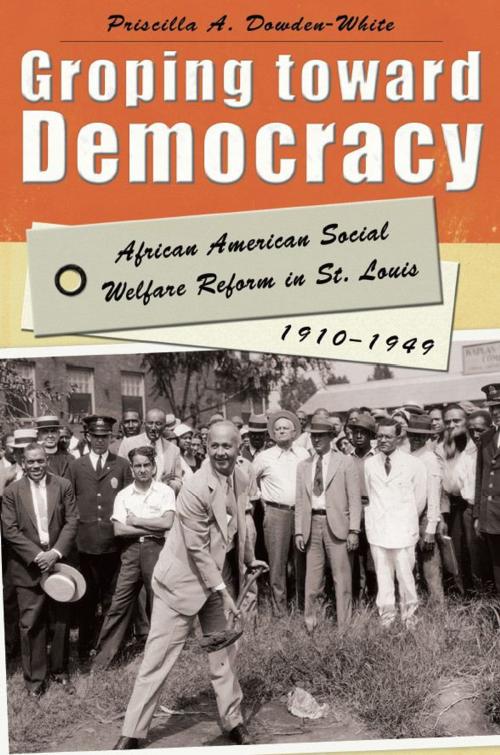Groping toward Democracy
African American Social Welfare Reform in St. Louis, 1910-1949
Nonfiction, Social & Cultural Studies, Social Science, Cultural Studies, African-American Studies, History, Americas, United States| Author: | Priscilla A. Dowden-White | ISBN: | 9780826272263 |
| Publisher: | University of Missouri Press | Publication: | March 23, 2011 |
| Imprint: | University of Missouri | Language: | English |
| Author: | Priscilla A. Dowden-White |
| ISBN: | 9780826272263 |
| Publisher: | University of Missouri Press |
| Publication: | March 23, 2011 |
| Imprint: | University of Missouri |
| Language: | English |
Decades before the 1960s, social reformers began planting the seeds for the Modern Civil Rights era. During the period spanning World Wars I and II, St. Louis, Missouri, was home to a dynamic group of African American social welfare reformers. The city’s history and culture were shaped both by those who would construct it as a southern city and by the heirs of New England abolitionism. Allying with white liberals to promote the era’s new emphasis on “the common good,” black reformers confronted racial segregation and its consequences of inequality and, in doing so, helped to determine the gradual change in public policy that led to a more inclusive social order.
In Groping toward Democracy: African American Social Welfare Reform in St. Louis, 1910–1949, historian Priscilla A. Dowden-White presents an on-the-ground view of local institution building and community organizing campaigns initiated by African American social welfare reformers. Through extensive research, the author places African American social welfare reform efforts within the vanguard of interwar community and neighborhood organization, reaching beyond the “racial uplift” and “behavior” models of the studies preceding hers. She explores one of the era’s chief organizing principles, the “community as a whole” idea, and deliberates on its relationship to segregation and the St. Louis black community’s methods of reform. Groping toward Democracy depicts the dilemmas organizers faced in this segregated time, explaining how they pursued the goal of full, uncontested black citizenship while still seeking to maximize the benefits available to African Americans in segregated institutions. The book’s nuanced mapping of the terrain of social welfare offers an unparalleled view of the progress brought forth by the early-twentieth-century crusade for democracy and equality.
By delving into interrelated developments in health care, education, labor, and city planning, Dowden-White deftly examines St. Louis’s African American interwar history. Her in-depth archival research fills a void in the scholarship of St. Louis’s social development, and her compelling arguments will be of great interest to scholars and teachers of American urban studies and social welfare history.
Decades before the 1960s, social reformers began planting the seeds for the Modern Civil Rights era. During the period spanning World Wars I and II, St. Louis, Missouri, was home to a dynamic group of African American social welfare reformers. The city’s history and culture were shaped both by those who would construct it as a southern city and by the heirs of New England abolitionism. Allying with white liberals to promote the era’s new emphasis on “the common good,” black reformers confronted racial segregation and its consequences of inequality and, in doing so, helped to determine the gradual change in public policy that led to a more inclusive social order.
In Groping toward Democracy: African American Social Welfare Reform in St. Louis, 1910–1949, historian Priscilla A. Dowden-White presents an on-the-ground view of local institution building and community organizing campaigns initiated by African American social welfare reformers. Through extensive research, the author places African American social welfare reform efforts within the vanguard of interwar community and neighborhood organization, reaching beyond the “racial uplift” and “behavior” models of the studies preceding hers. She explores one of the era’s chief organizing principles, the “community as a whole” idea, and deliberates on its relationship to segregation and the St. Louis black community’s methods of reform. Groping toward Democracy depicts the dilemmas organizers faced in this segregated time, explaining how they pursued the goal of full, uncontested black citizenship while still seeking to maximize the benefits available to African Americans in segregated institutions. The book’s nuanced mapping of the terrain of social welfare offers an unparalleled view of the progress brought forth by the early-twentieth-century crusade for democracy and equality.
By delving into interrelated developments in health care, education, labor, and city planning, Dowden-White deftly examines St. Louis’s African American interwar history. Her in-depth archival research fills a void in the scholarship of St. Louis’s social development, and her compelling arguments will be of great interest to scholars and teachers of American urban studies and social welfare history.










![Cover of the book The Vanishing Newspaper [2nd Ed] by Priscilla A. Dowden-White](https://www.kuoky.com/images/2009/september/300x300/9780826272034-5PcR_300x.jpg)




